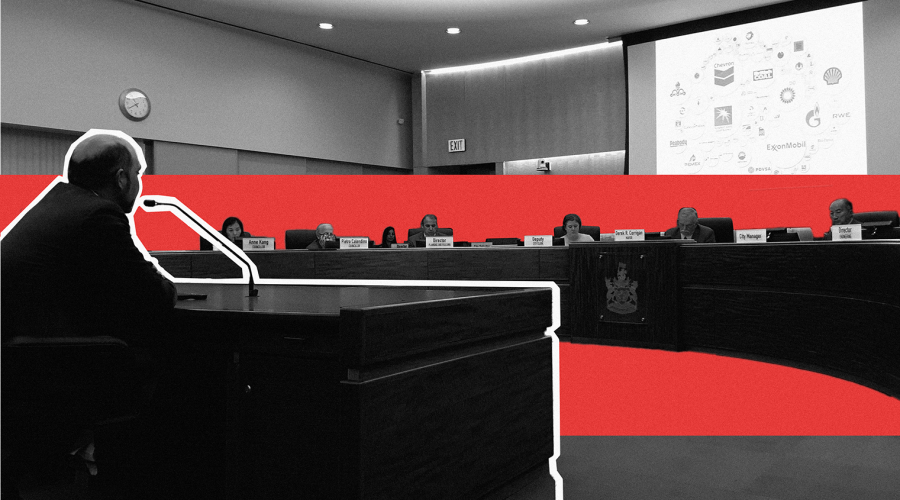
Suing the world’s largest oil companies will ensure that BC communities and local governments have the resources needed to pay for skyrocketing climate costs, while making the fossil fuel industry curtail its climate-destroying practices. Here’s how it works.
How do we sue Big Oil?
Step 1
We build a movement of British Columbians who support suing Big Oil for a portion of climate costs in BC communities. People show their support and join the campaign by signing the Sue Big Oil Declaration.
Step 2
Working together, we convince our local governments to jointly launch a class action lawsuit targeting the world’s largest oil companies.
Step 3
Local governments sue Big Oil for a fair share of climate costs. Class action lawsuit goes to court. For more information about how a lawsuit would work, read Suing Fossil Fuel Giants.
Frequently Asked Questions
Can we really win against some of the biggest companies in the world?
Yes we can! In fact, Shell has already lost a climate lawsuit in the Netherlands. Meanwhile there are dozens of lawsuits targeting oil, gas and coal for climate impacts in the United States.
28 Canadian law professors think that local governments in Canada should consider this type of lawsuit too.
You may have heard about past lawsuits involving the tobacco, pharmaceutical and asbestos industries. In each of these cases, huge companies thought that they were invincible, but ultimately had to pay the price for their irresponsible behaviour.
Which oil companies will be targeted in the lawsuit?
The local governments engaged in the lawsuit will choose which companies to sue. Under Canadian law, lawsuits can be brought against multinational companies in BC’s courts as long as there is a “real and substantial connection” to the province. The fact that the climate impacts are being felt in BC creates that “real and substantial connection” and allows our local governments to sue international companies under BC law. The Sue Big Oil campaign proposes targeting the world’s largest multinational fossil fuel companies, such as Chevron (a US company), Shell (a UK company) and Exxon (a US company), and even Saudi Aramco (a Saudi Arabian company), as they are responsible for the most greenhouse gas emissions.
Won’t a lawsuit take years? This is a climate crisis - we don’t have time to lose!
While it is true it could take years to get a final decision in our lawsuit, filing the lawsuit will still have a huge, immediate impact on the behaviour of these companies, their investors and governments.
Corporations are required by law to inform investors of any “material risks” associated with their business operations. When they do, investors and governments will realize that investing in, and subsidising, oil, gas and coal brings legal and financial risks, and then change their investment decisions. It is also possible that Big Oil will decide to settle rather than go to trial.
Although it may take years, winning a lawsuit against Big Oil will still help BC communities pay the skyrocketing costs of climate change, while ensuring that fossil fuel companies pay their fair share, which is crucial.
Is this just a way for lawyers to make money?
The lawyers for this lawsuit would be selected by the local governments filing the lawsuit, and there is no expectation that West Coast Environmental Law (the Secretariat to Sue Big Oil) and other lawyers involved in the campaign will be retained. We anticipate that the lawyers that the local governments hire would include lawyers working at reduced rates and with the support of volunteer lawyers, law students, in-house municipal lawyers and lawyers working for public interest non-profit organizations.
Shouldn’t we focus on other ways of reducing the impacts of climate change, like shrinking our carbon footprint?
When it comes to climate change, there is no single approach or solution that will fix the problem. We need to do everything we can to prevent and manage the effects of climate change. Reducing one’s carbon footprint is a good idea – especially if it’s a large carbon footprint! But fossil fuel companies, among the biggest polluters, need to do their part too.
Climate change is already causing, and will continue to cause devastation in our communities for decades to come. And the most marginalised people within our communities are the most vulnerable to climate impacts. Therefore our communities still need a way to pay for the skyrocketing costs of climate damage, adaptation and preparedness. Suing Big Oil will help communities pay for climate costs – and will force a change in industry.
Who is behind Sue Big Oil?
Sue Big Oil is a collaboration of ordinary British Columbians concerned about climate change and the harm caused to BC communities by the global fossil fuel industry. West Coast Environmental Law founded the campaign and acts as its secretariat and legal adviser. See About the Campaign at www.suebigoil.ca for a complete list of endorsers and affiliated organizations.